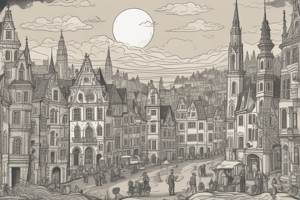Podcast
Questions and Answers
Which article is correct for 'Haus'? (Translation: house)
Which article is correct for 'Haus'? (Translation: house)
- die
- de
- der
- das (correct)
Which article is correct for 'Katze'? (Translation: cat)
Which article is correct for 'Katze'? (Translation: cat)
- de
- der
- das
- die (correct)
Which article is correct for 'Vogel'? (Translation: bird)
Which article is correct for 'Vogel'? (Translation: bird)
- der (correct)
- die
- de
- das
Which article is correct for 'Brot'? (Translation: bread)
Which article is correct for 'Brot'? (Translation: bread)
Which article is correct for 'Mann'? (Translation: man)
Which article is correct for 'Mann'? (Translation: man)
Which article is correct for 'Kind'? (Translation: child)
Which article is correct for 'Kind'? (Translation: child)
Study Notes
Vocabulary Study Notes
- Nouns represent people, places, animals, and objects in German.
- Definite articles in German are categorized by gender: masculine (der), feminine (die), and neuter (das).
List of Selected Nouns with English Translations
- Apfel: apple
- Haus: house
- Vater: father
- Mutter: mother
- Kind: child
- Natur: nature
- Kultur: culture
- Brot: bread
- Hund: dog
- Katze: cat
- Vogel: bird
- Handy: mobile phone
- Wohnung: apartment
- Lampe: lamp
- Auto: car
- Tür: door
- Fenster: window
- Tor: gate
- Telefon: telephone
- Balkon: balcony
- Mann: man
- Frau: woman
- Fußballplatz: soccer field
- Klub: club
- Stadion: stadium
- Party: party
- Bahnhof: train station
- Bus: bus
- Zug: train
- U-Bahn: underground
- S-Bahn: suburban train
- Fahrrad: bicycle
- Motorrad: motorcycle
- Flugzeug: airplane
- Schiff: ship
- Straßenbahn: streetcar
- Roller: scooter
- Taxi: taxi
Contextual Understanding
- Understanding the articles is crucial for proper usage in sentences.
- Nouns like "Hund" and "Katze" also represent common pets, while terms like "Bahnhof" and "Bus" relate to transportation.
- Objects like "Lampe" and "Fenster" are everyday items found in homes.
- Cultural references can be noted in terms like "Natur" and "Kultur".
- A variety of modes of transportation is represented, emphasizing their importance in modern society.
Studying That Suits You
Use AI to generate personalized quizzes and flashcards to suit your learning preferences.
Description
Test your knowledge of German vocabulary with this quiz focused on common objects, family members, and modes of transportation. Evaluate your familiarity with essential nouns in everyday life and how to use them in sentences.



